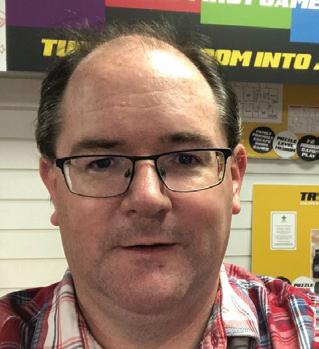
2 minute read
THOUGHT FOOD FOR
Sustainability Needs To Be A Critical Pillar Of Toy Safety

Sonia Sanchez, toy industry impact and sustainability consultant, asks why the future we leave our children isn’t a toy safety concern?
In the toy industry, children’s safety is paramount and a central concept in product development. It’s ingrained in the DNA of those in the toy business, and that’s commendable.
If something is deemed unsafe, an alternative is sought, even if more expensive. If the option is too costly, the toy won’t reach the shelves. True, there is regulation, but toy people genuinely want to protect children.
Then we have sustainability. In principle, brands are happy to favour ecofriendly options. But good intentions are often abandoned when costs are higher or significant changes in processes or supply chains are required.
When safe recycled plastic is unavailable, most companies continue business as usual instead of joining efforts to overcome the challenge.
But when we choose a less sustainable option we contribute to climate change, pollution, and biodiversity loss and put children’s safety at risk.
The UN’s refugee agency, the UNHCR, reports an annual average of 21.5 million people have been forcibly displaced by weather-related events such as floods, storms, wildfires, and extreme temperatures – since 2008. According to the World Health Organisation, air pollution is linked with seven million premature deaths annually. Problems are affecting children today.
We must revisit our definition of safety. We must expand it beyond protection from toxic substances, cuts, and choking hazards to address climate change, pollution, and biodiversity loss with the commitment and sense of emergency these crises deserve.
The toy industry today lives in a paradox: compromising children’s safety and future while striving for their happiness. It doesn’t have to be this way.
Industry Framework Gets Gold Star From Golden Bear
Barry Hughes, managing director at Golden Bear is a founding member of the Products of Change community and the efforts to develop and launch the Industry Framework.


Being members and being a part of the early conversations around the development of an Industry Framework [launched in this issue] is something we are very proud of.
At a time when many businesses, including our own, were searching for answers to try and gain direction on sustainability, the collaboration with brand owners, licensors, and retailers was just what we all needed.
The Industry Framework acts to give clarity to a spread of different businesses, from brand owners to retailers, but also indirectly to other stakeholders such as suppliers as the guidance flows down. This Framework breaks down the steps that can be taken in the short, medium, and long-term, to help companies build or review their sustainable strategies.
It makes me very proud of the work our whole team at Golden bear has put in and the knowledge gained to be more sustainable. We are well into our journey now, but we all have a very long way to go to get to where we need to be.
Dean Greasley, TDP Textiles’ director of licensing highlights a growing confidence in sustainability. Our sustainability journey started a few years ago and we are now fully committed to positive change. We want to work with suppliers, retailers, and licensing partners to make improvements large and small, wherever possible.
To show our commitment, we are once again proud sponsors of the Sustainability in Licensing Conference, having been filled with confidence that we were on the right course when our coordination manager, Laura Chapman attended the Products of Change Packaging Design for the Circular Economy educational course in March this year.
The Sustainability in Licensing Conference gave us the confidence to take the next step. Knowing that we are right on track on the sustainability journey is so valuable, but gaining the reassurance that we are ahead of the curve in certain areas has driven us even harder.
One early step we are particularly proud of was converting our Indian office and factory to become fully solar powered. Also, in our latest steps to reduce our carbon footprint here in the UK, our switch to electric company cars will be completed by the end of the year.
A new generation of consumers are emerging who are environmentally conscious who will have high sustainability expectations and we need to ensure we meet and exceed those expectations.










